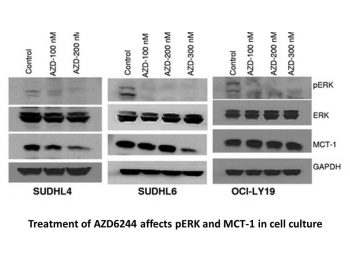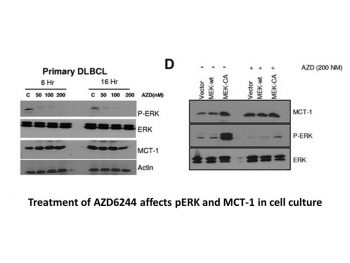| CAS NO: | 943332-08-9 |
| 规格: | ≥98% |
| 包装 | 价格(元) |
| 500mg | 电议 |
| 1g | 电议 |
| 2g | 电议 |
| Molecular Weight (MW) | 555.76 |
|---|---|
| Formula | C17H17BrClFN4O7S |
| CAS No. | 943332-08-9 |
| Storage | -20℃ for 3 years in powder form |
| -80℃ for 2 years in solvent | |
| Solubility (In vitro) | DMSO:>100 mg/mL |
| Water: N/A | |
| Ethanol: N/A | |
| Solubility (In vivo) | 4% DMSO+30% PEG 300+5% Tween 80+ddH2O: 5 mg/mL |
| Synonyms | ARRY-142886 sulfate; AZD6244 sulfate; AZD-6244; AZD 6244; ARRY142886; ARRY 142886; ARRY-142886; ARRY886; ARRY-886; ARRY 886 sulfate |
| In Vitro | In vitro activity: AZD6244 is not competitive with ATP and inactivates the ERK1/2 phosphorylation with IC50 concentrations below 40 nM. AZD6244 also inhibits the growth of primary HCC cells through inhibition of ERK1/2 and p90RSK phosphorylation, accompanied with elevation of the cleavage of caspase-3 and caspase-7, and cleaved poly(ADP)ribose polymerase. AZD6244 has little effects on the p38, c-Jun-NH2-kinase, phosphatidylinositol 3-kinase, and MEK5/ERK5 pathways. AZD6244 is sensitive to Raf mutations in breast cancer cell lines and Ras mutations in NSCLC cell lines. Kinase Assay: Anti-MEK1 antibody is used to immunoprecipitate MEK1 molecules. MEK kinase activity is measured as the ability of immuno-isolated MEK1 to activate recombinant ERK1 in a coupled assay using MBP as the end point of the assay. Phosphorylated MBP is resolved on a 14% SDS-PAGE gel and vacuum-dried before exposure to X-ray film. Cell Assay: Cells (Primary HCC cell lines including 2-1318, 4-1318 and 26-1004 cells) are seeded at a density of 2.0 × 104. After 48 hours incubation, the cells are rinsed twice with culture media. Cells are treated with various concentrations of AZD6244 for 24 or 48 hours. Cell viability is determined by the 3-(4,5-dimethylthiazol-2y1)-2,5-diphenyltetrazolium bromide (MTT) assay. Cell proliferation is assayed using a bromodeoxyuridine kit. |
|---|---|
| In Vivo | AZD6244 significantly inhibits phosphorylation of ERK1/2 in 2-1318, 5-1318, 26-1004 and 4-1318 xenografts and induces apoptosis in primary 2-1318 cells by activating the caspase pathway. AZD6244 could inhibit the tumor growth in HT-29 xenograft, which is a colorectal tumor model carrying a B-Raf mutation, at a dose of 100 mg/kg and the tumor growth inhibition of AZD6244 is better than it of Gemcitabine. Otherwise AZD6244 could inhibit HCC xenografts tumor growth, which associated with increased apoptosis and down-regulation of cell cycle regulators, including cyclin D1, Cdc-2, CDK2 and 4, cyclin B1, and c-Myc |
| Animal model | HCC xenografts in mice homozygous for the SCID (severe combined immunodeficiency) mutation |
| Formulation & Dosage | Dissolved in water; 50 or 100mg/kg; Oral gavage |
| References | Mol Cancer Ther. 2007 Jan;6(1):138-46; Clin Cancer Res. 2007 Mar 1;13(5):1576-83. |
Structure of ARRY-142886 and its ability to inhibit enzymatic MEK1 activity. Clin Cancer Res. 2007 Mar 1;13(5):1576-83. |
Inhibition of tumor growth and decreased tumor phospho-ERK1/2 levels in a mouse HT-29 xenograft model.
Inhibition of basal and induced ERK1/2 phosphorylation in human cancer cell lines and PBMCs. Clin Cancer Res. 2007 Mar 1;13(5):1576-83. |
Tumor growth inhibition in the mouse BxPC3 xenograft model. Clin Cancer Res. 2007 Mar 1;13(5):1576-83. |
 |  |
